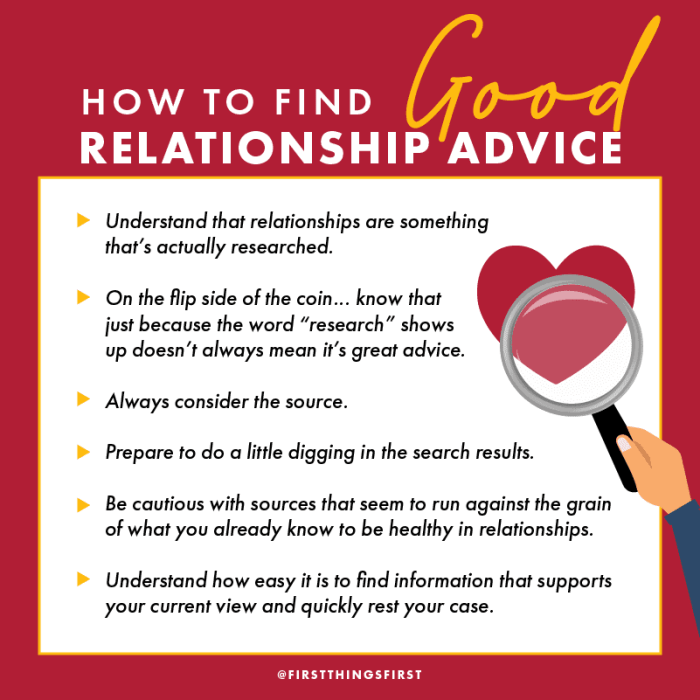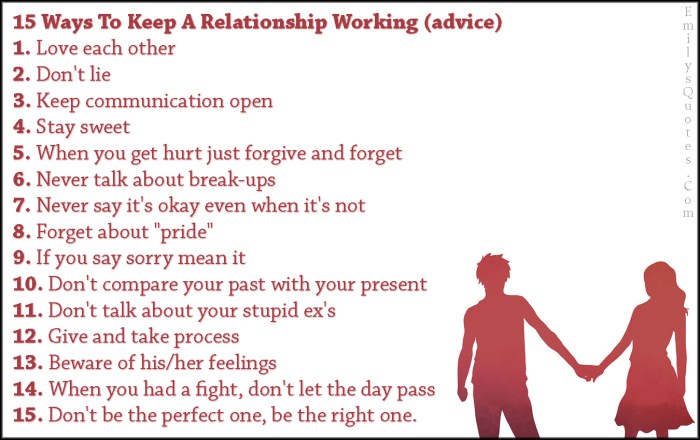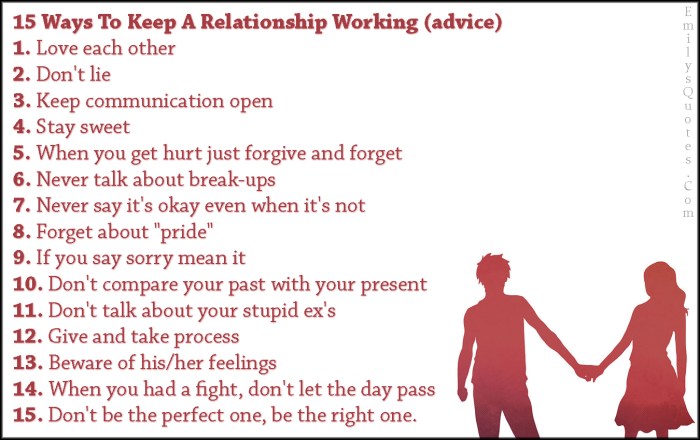Relationship Advice: Keys to Healthy and Strong Partnerships sets the stage for exploring the importance of seeking advice in relationships, uncovering various sources, and diving into effective communication and trust-building strategies. Get ready for some real talk on navigating the ups and downs of relationships!
From resolving conflicts to overcoming challenges, this guide is your go-to for all things relationship advice. So, grab your seat and let’s dive into the world of maintaining a healthy and thriving partnership.
Importance of Relationship Advice
Seeking relationship advice is crucial for maintaining a healthy partnership as it provides an external perspective on issues that may be clouded by emotions. It can offer valuable insights, strategies, and tools to navigate conflicts effectively and improve communication between partners.
Resolving Conflicts
- Relationship advice can help couples address conflicts in a constructive manner, avoiding escalation and resentment.
- By learning effective communication techniques, partners can express their feelings and needs without causing further harm to the relationship.
- Therapists or counselors can guide couples in understanding the root causes of their conflicts and finding sustainable solutions.
Strengthening Bonds
- Through relationship advice, couples can deepen their emotional connection and build trust in each other.
- Developing empathy and active listening skills can enhance understanding and intimacy in the relationship.
- Learning to appreciate each other’s strengths and differences can create a stronger bond and a sense of partnership.
Positive Impact
- Many couples have reported that relationship advice has helped them overcome challenges and reignite the spark in their relationship.
- By implementing advice from experts or experienced individuals, couples have been able to navigate rough patches and grow stronger together.
- Regular guidance and support from relationship counselors have prevented small issues from snowballing into major problems, preserving the relationship.
Sources of Relationship Advice
When seeking relationship advice, individuals have various sources to turn to for guidance. These sources can range from professionals like therapists to more informal sources like friends or family members. It is important to consider the credibility of these sources to ensure the advice received is reliable and beneficial.
Professional Therapists
Professional therapists are trained to provide guidance and support for individuals experiencing relationship issues. They can offer unbiased perspectives and tools to help couples navigate challenges and improve communication.
Books and Online Forums
Books and online forums are other valuable sources of relationship advice. These resources can provide a wide range of perspectives and insights on different relationship issues. However, it is essential to critically evaluate the credibility of the authors or contributors to ensure the advice is reliable.
Friends and Family Members, Relationship Advice
Seeking advice from friends or family members is common, as they are often easily accessible and familiar with the individuals involved. While their support can be comforting, it is important to recognize their potential biases and limitations in providing objective advice.
Comparing Benefits
When deciding between seeking advice from professionals or friends and family members, it is essential to consider the benefits of each. Professionals offer expertise and objectivity, while loved ones provide emotional support and personal insights. Both can be valuable depending on the situation.
Considering Credibility
Regardless of the source, it is crucial to consider the credibility of the advice given. Evaluating the qualifications, experience, and track record of the source can help ensure that the guidance provided is trustworthy and effective in addressing relationship issues.
Effective Communication in Relationships
Effective communication plays a crucial role in maintaining a healthy relationship. It involves expressing thoughts, feelings, and needs clearly, as well as actively listening to your partner. Without effective communication, misunderstandings can arise, leading to conflicts and distance between partners.
Tips for Improving Communication Skills with a Partner
- Practice active listening: Give your partner your full attention when they are speaking, and try to understand their perspective without interrupting.
- Use “I” statements: Instead of blaming your partner, focus on expressing your own feelings and needs using phrases like “I feel” or “I need.”
- Be open and honest: Share your thoughts and emotions openly, even if they are difficult to discuss. Avoid keeping things bottled up.
- Avoid assumptions: Clarify any doubts or misunderstandings by asking questions and seeking clarification from your partner.
- Seek feedback: Encourage your partner to provide feedback on your communication style and be open to making adjustments if needed.
Examples of Miscommunication Leading to Misunderstandings
- Assuming your partner knows what you want without clearly expressing it, leading to unmet expectations.
- Using harsh language or tone during a disagreement, causing hurt feelings and escalating the conflict.
- Not listening to your partner’s perspective and jumping to conclusions, resulting in misunderstandings and resentment.
- Misinterpreting non-verbal cues, such as body language or facial expressions, leading to misunderstandings about your partner’s feelings or intentions.
Building Trust in a Relationship

Building trust in a relationship is crucial for its success and longevity. Trust forms the foundation of a healthy partnership and affects the overall dynamics between two individuals.
Strategies for Building and Maintaining Trust
- Open Communication: Honest and transparent communication is essential to build trust. Share your thoughts, feelings, and concerns openly with your partner.
- Consistency: Be consistent in your actions and words to show reliability and dependability.
- Respect: Treat your partner with respect and show appreciation for their opinions and boundaries.
- Empathy: Show empathy and understanding towards your partner’s feelings and experiences.
Behaviors that Strengthen or Weaken Trust
- Strengthen Trust:
- Keeping Promises: Fulfilling promises and commitments demonstrates reliability.
- Being Vulnerable: Sharing your vulnerabilities can deepen emotional connection and trust.
- Weaken Trust:
- Lying: Deception and dishonesty can erode trust quickly in a relationship.
- Betrayal: Violating trust through actions like infidelity can severely damage the foundation of a relationship.
Overcoming Relationship Challenges

Relationships can face various challenges that can put a strain on the bond between partners. It’s essential to address these challenges effectively to maintain a healthy and strong relationship. Here, we will discuss common relationship challenges and provide advice on how to overcome them with patience and compromise.
Infidelity
Infidelity is a major challenge that can shake the foundation of a relationship. Trust is broken, and rebuilding it takes time and effort. It’s crucial for both partners to communicate openly about their feelings and concerns. Seeking couples therapy or counseling can also help in navigating the complex emotions associated with infidelity. Remember, rebuilding trust after such a betrayal requires patience and understanding from both parties.
Lack of Intimacy
A lack of intimacy can lead to feelings of disconnect and dissatisfaction in a relationship. To overcome this challenge, partners should make an effort to prioritize quality time together and communicate their needs and desires openly. Planning date nights, engaging in activities that both partners enjoy, and expressing affection can help reignite the spark in the relationship. Remember, intimacy is not just physical but also emotional and requires effort from both partners.
Communication Issues
Communication is key in any relationship, and when communication issues arise, it can create misunderstandings and conflicts. To overcome communication challenges, partners should practice active listening, express themselves clearly and calmly, and be open to feedback. Setting aside dedicated time for meaningful conversations without distractions can also improve communication. Remember, effective communication requires both partners to be willing to listen and understand each other’s perspectives.
Patience and Compromise
In overcoming relationship challenges, patience and compromise play a crucial role. It’s important to understand that resolving issues takes time and effort from both partners. Patience allows for emotional healing and growth, while compromise helps find common ground and solutions to problems. Remember, relationships are a journey, and navigating challenges together can strengthen the bond between partners.
